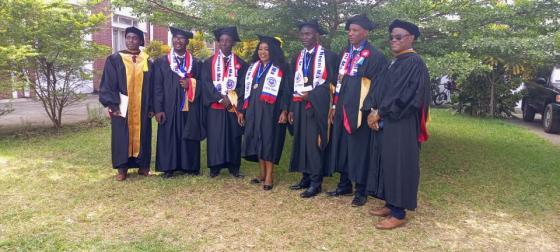Liberia: UL Makes History, Graduates First Environmental Science Students

Some members of the faculty and some of the graduates in a group photo.
The University of Liberia has graduated its first batch of environmental science students as the country works to meet its target of net zero emissions by 2050.
The graduates, seven in all, now have the required knowledge to address the country's needs for research that would tackle present and future climate change challenges. They are the first batch of the forty students who enrolled for the UL’s Environmental Studies and Climate Change (ESCC) degree programs.
“This graduation today is a milestone. It is a clear manifestation of the level of work we have done since we launched the program in 2019,” Dr. Charles Asumana, Director of the ESCC Graduate School program. “We were given a task and I think we have executed that properly. This graduation exercise is the success story of our achievements.”
The seven graduates, according to the university department, are the most prepared locally trained environmental scientists and technicians. The graduates’ success is a milestone in the history of Liberia given that venturing into environmental studies for Liberians was not only difficult but very expensive as students had to travel abroad for such an opportunity. This probably resulted in having far fewer environmental scientists and technicians.
The ESCC programs, Dr. Asumana disclosed, combines scientific knowledge with the understanding of economic, and social impacts of climate change adaptation and vulnerability, waste, and disaster management. The ESCC courses, he said place a premium on research and greater understanding of environmental disasters, related issues of climate change, and biodiversity — to fill in the gap of the increasing labor market demand for professionals knowledgeable about environmental issues in the country.
“We are not preparing our students only for the local markets but internationally as well,” Dr. Asumana said. “This is why we have a world-class faculty. Almost all of the school’s instructors are terminal degree holders.
Inaugurated in 2019, the ESCC degree program at the University of Liberia offers both undergraduate and graduate academic programs that support the United Nations Sustainable Development Goal on Climate Action. These professional programs do not just capture climate change issues but disaster management as a means of contributing significantly to solving environmental issues in Liberia and its surroundings.
The UL initiative is supported by UNDP’s National Adaptation Plans Project (NAPs) in partnership with the Environmental Protection Agency (EPA) and funded by the Green Climate Fund -- offering Masters in Environmental Science and Climate Change, a Masters of Arts in Environmental Management, and a Bachelor’s Degree in Environmental Studies.
The new interdisciplinary Master of Science in Environmental Resource Science at the university also focuses on water and soil, two of the world’s most critical resources as well as waste management and other areas. The vision for the establishment of the ESCC was conceived in 2018 by the EPA who shared it with other stakeholders. This culminated in the signing of a Memorandum of Understanding between the university and UNDP.
Via the programs, the University of Liberia is to produce professionals whose qualifications, skills, and competencies will meet the community, county, national, and international needs.
“We do have a huge plan of launching our Ph.D. very soon. we are working out the modalities with our partners to ensure that this happens in the soonest possible time,” disclosed Assistant Professor of Physical Chemistry/Climate Change, Dr. James McClain. “Our students are prepared for a career in which they investigate, characterize and manage the environment and the resources responsibly and effectively.”
Meanwhile, the president of the graduating class, F. Oliver Williyan, noted that as the maiden class, the burden is now upon him and his colleagues to put into practice all that they have learned over the years. He added that the journey was not an easy one as its toughness led to very few candidates getting the nod to graduate. Williyan lamented how rigorous the program is but that it has prepared him and his colleagues for the tougher tasks ahead.
“The burden is now upon us to prove to the outside world that ESCC is a place of excellence. Our studies were tough but rewarding,” he said.
